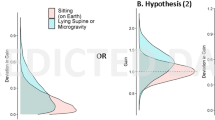Abstract
A series of step-tracking experiments was conducted before, during, and after a 3-week space mission to assess the effects of prolonged microgravity on a non-postural motor-control task. In- and post-flight accuracy was affected only marginally. However, kinematic analyses revealed a considerable change in the underlying movement dynamics: too-small force and, thus, too-low velocity in the first part of the movements was mainly compensated by lengthening the deceleration phase of the primary movement, so that accuracy was regained at its end. The observed in-flight decrements in peak velocity and peak acceleration point to an underestimation of mass, in agreement with the re-interpretation hypothesis of Bock et. al. Post-flight no reversals of the in-flight changes (negative aftereffects) were found. Instead, there was a general slowing down, which could be due to post-flight physical exhaustion.
Similar content being viewed by others
Author information
Authors and Affiliations
Additional information
Received: 8 January 1999 / Accepted: 6 July 1999
Rights and permissions
About this article
Cite this article
Sangals, J., Heuer, H., Manzey, D. et al. Changed visuomotor transformations during and after prolonged microgravity. Exp Brain Res 129, 378–390 (1999). https://doi.org/10.1007/s002210050906
Issue Date:
DOI: https://doi.org/10.1007/s002210050906



